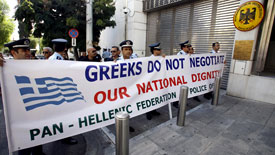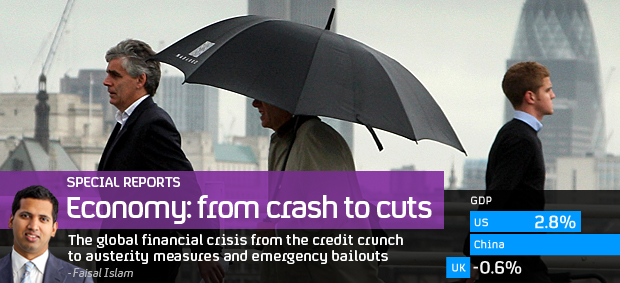Will a Greece default save the euro?
As it runs out of money, Greece holds crisis talks with the IMF and private banks, while a massive new bailout package to stabilise the eurozone is being considered.

There is worried speculation that Greece will be pushed into bankruptcy as part of a deal to secure other vulnerable countries in the single currency.
Details of the plan were worked on at the weekend’s IMF meeting: but there are splits between these governments.
The US and the UK are anxious to see decisive action. Many eurozone countries, particularly Germany, are more cautious – as they will have to underwrite any new deal.
The plan designed to finally rescue the Euro has three elements:
1. Greece to default
Greece will be allowed to default on its debts. About half of the 360 billion Euros it owes will be wiped out, leaving a debt that the country can service.
2: Banks given extra capital
This will lead to enormous losses for European banks, so these will be given extra capital reserves by European governments.
3: European Financial Stability Facility expanded
Finally the European Financial Stability Facility (EFSF) will be massively expanded, so it can provide funding to not just Ireland and Portugal but Spain and Italy if needed.
Politicians are playing a dangerous game. We’ve been here before.
The Euro summit in July was hailed as the solution to the crisis – but markets then lost faith as individual European countries proved lukewarm about implementing the changes.
Head of the French central bank today specifically ruling out extra capital for French banks. And the Greek Finance Minister says his country will never default.
That may be public posturing – but the danger is that financial markets remain confused about whether this problem is finally going to be confronted.
Faisal Islam blogs on the plan to save the euro:
The plan would appear to be to pad up Europe's banks with a recapitalisation, brandish a very large €-bazooka to wave furiously at the markets, and thereby ring fence the eurozone banking system and Italy and Spain from a controlled explosion underneath Greece's epic debt pile.
Simple. Well, no. I have attended 10 such meetings where well-laid plans at high powered tables of finance ministers have come unstuck rather quickly. In this case six days seems the appropriate time frame.
Read more on Faisal's blog: Six weeks to save the Euro? More like six days
-
Latest news
-
‘I violated my moral compass working for Trump,’ former lawyer testifies3m

-
Working class creatives in film and TV at lowest level in decade5m

-
Israeli police investigating attack on Gaza aid convoy4m

-
Biden announces major tariff increase on Chinese-imported green tech3m

-
‘If NHS can afford it, people with obesity should have Semaglutide,’ says weight loss expert5m

-





